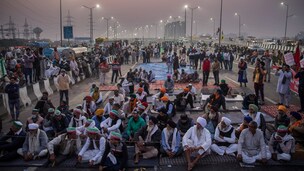Frame SOPs for post-COVID-19 complications in patients, Delhi HC tells AAP govt
The directions were issued by a bench of Justices Hima Kohli and Subramonium Prasad while hearing a PIL by advocate Rakesh Malhotra seeking increase in the COVID-19 testing numbers in the national capital and getting speedy results.
PTI
December 23, 2020 / 01:01 PM IST
The Delhi High Court on Wednesday directed the AAP government to frame standard operating procedures (SOPs) to deal with post COVID-19 complications and to ensure that facilities are available to test and quarantine travellers from the UK where a new strain of coronavirus has been discovered.
The directions were issued by a bench of Justices Hima Kohli and Subramonium Prasad while hearing a PIL by advocate Rakesh Malhotra seeking increase in the COVID-19 testing numbers in the national capital and getting speedy results.
Malhotra, during the hearing, told the court that there should be some SOPs for managing post COVID-19 complications in those who have recovered from the infection.
Subsequently, the bench asked the Delhi government, represented by additional standing counsel Satyakam, to frame the SOPs.
The court also took note of the district-wise data of COVID-19 infections in the national capital and the submission by Delhi government that it was "enhancing contact tracings and creating more containment zones" in areas where the positive rate is more.
The Delhi government also told the court that in a meeting held on December 21 by the Delhi Disaster Management Authority (DDMA), it was decided that the "representative testing" shall be followed and the focus would be more on pockets where the positivity rate is more.
According to the status report filed by the Delhi government, as of December 19 the positivity rate was below 2 percent in all districts except north-west where it was 2.12 percent.
The court on December 3 had directed the Delhi government to "focus on testing and tracing" to deal with the COVID-19 infection numbers in the national capital, as the "fear factor" regarding the virus was "huge" in the minds of people.










_2020091018165303jzv.jpg)


























